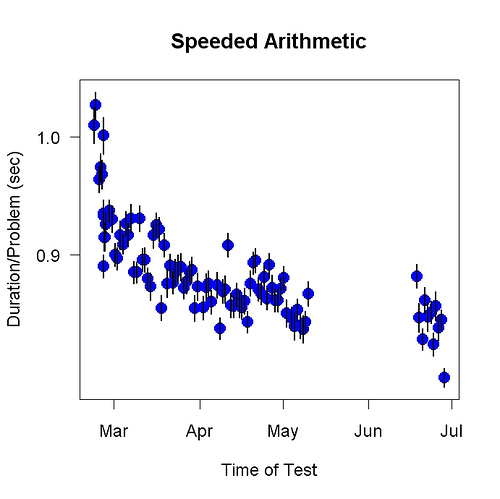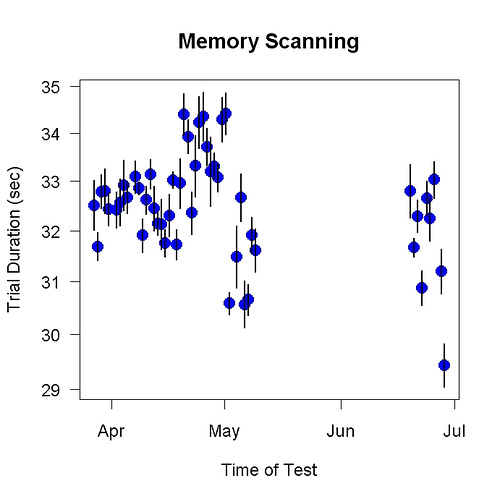I have always stopped self-experimenting when I travel because so much changes. Surely I will sleep differently, etc., far from home. However, it is not so obvious my arithmetic speed (how fast I do arithmetic problems such as 6 + 3) will change. I am measuring arithmetic speed as part of my study of omega-3 (directory).
I recently spent a week in Los Angeles. For the first time I continued self-experimentation while traveling. When I arrived I bought a bottle of flaxseed oil. I continued to take 4 T/day and did the same mental-function tests I do at home: arithmetic, memory-scanning, and balance. I have described these tests in other posts.
My balance was much worse in Los Angeles, apparently because what I see during the test changed (because the floor and other surroundings are different). I hadn’t realized how much that mattered. My arithmetic and memory-scanning results were roughly the same as the results at home — that is, until the last day. This graph shows arithmetic speeds:

This graph shows memory-scanning results:

The sudden improvement on the last day — also clear in the balance test — was a big surprise. It was too large to be due to practice, nor could it be due to being in LA — the previous 5 measurements were also in LA. It did, however, have a ready explanation: The previous night I had gotten back late and had forgotten to take the oil. So instead of taking 4 T at 11 pm I took it at 7 am. I did the tests at about noon. Instead of 8 or 9 hours between oil ingestion and test, in this case the difference was 5 hours.
If this explanation is correct, there is a short-lived effect of flaxseed oil on brain function — present 5 hours after ingestion but absent or weaker 8 hours later. Which, as a scientist, makes me say “Wow!” If this effect exists, it’s a new tool, the most precious and powerful thing in science. I can use it to compare amounts of flaxseed oil, oils (e.g., fish oil), and foods (e.g., salmon).
My current way of measuring omega-3 effects requires one/day tests repeated for weeks. When I reduced the amount of flaxseed oil I was taking from 4 T/day to nothing, it took more than a day with the lower dose before performance even went down, and many more days before performance stabilized. This meant that experiments had to last several weeks. If the new effect exists, it will allow much faster experiments.